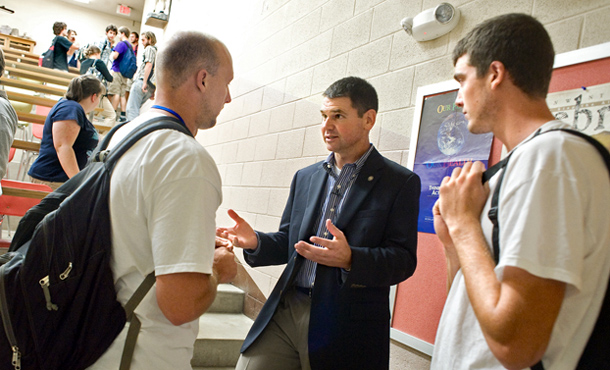Posted with permission from Daily News Record, Sept. 13, 2011
HARRISONBURG – When Matt Lohr, commissioner of the Virginia Department of Agriculture and Consumer Services, decided to open a corn maze on Lohrs Farm, his grandfather didn’t think the business move would pan out. “He thought it was crazy that people would put down money to get lost in a field of corn,” said Lohr, who presented a lecture on sustainable and organic farming in Virginia at Eastern Mennonite University on Monday. “That is a completely different way of farming than what my grandfather did, but we learned very quickly there was a great demand.
“That is the reason agriculture has continued to grow; it adapts.”
During his lecture, Lohr, a former state delegate who owns Lohrs Farm in his hometown of Broadway, encouraged about 70 EMU students to help shape the future of what he says is an evolving agriculture industry.
“I think there are so many things out there that we have not scratched the surface of. … Just remember that the human brain is powerful,” he said. “It all starts with being able to think outside the way things are normally done.”
Pros And Cons
Corn mazes and other agritourism initiatives are ways the face of agriculture is evolving, Lohr said.
In the last decade, he said, the push to “buy fresh, buy local” also has changed the farming landscape. That trend can be seen in the growing number of farmers markets in Virginia, which has doubled in just the past five years, Lohr said.
In the future, he said, the nation will continue to see an increasing number of farmers markets and roadside produce stands.
“There is a real yearning for a lot of people to say, ‘I want to know where my food is coming from,'” Lohr said.
While most American farming operations remain small – about 1.7 million of the 2.1 million farms in the United States have annual sales of less than $250,000, according to a 2009 Environmental Protection Agency report – the largest 100,000 account for three-quarters the nation’s food supply.
Food production percentages aside, Lohr weighed in on the pros and cons of both kinds of operations.
“Agriculture is such a diverse industry and I think a lot of people have a one-sided image,” he said.
National food suppliers, he said, create jobs and give the general public access to a cheap and consistent food source, while smaller operations generate higher-quality products and can more easily control the spread of diseases among livestock.
“One size doesn’t fit everyone; they both play a very important role,” Lohr said.
Agriculture in Virginia, accounting for an economic impact of $55 billion per year, is the state’s largest industry, Lohr said. The commonwealth has more than 47,000 farms and the industry provides more than 357,000 jobs, he said.
EMU elementary education major Jeremy Heizer, 21, who grew up on a farm, says even he took something away from Lohr‘s talk.
“I live on a farm, so I was interested in seeing what he had to say,” Heizer said. “I learned some things I didn’t know about farming.”
Lecture Series
Lohr‘s hour-long talk kicked off the Suter Seminar Series at EMU, a yearlong slate of events at which academics and industry professionals are invited to discuss topics in science, sustainability and health. Other lecture topics for this year include water sanitation, post-traumatic stress disorder and medicinal and edible plants.
EMU has offered the series for about 10 years, according to Roman Miller, a professor of biology and one of the series’ faculty coordinators.
“These are like little windows into the world of science,” Miller said.
